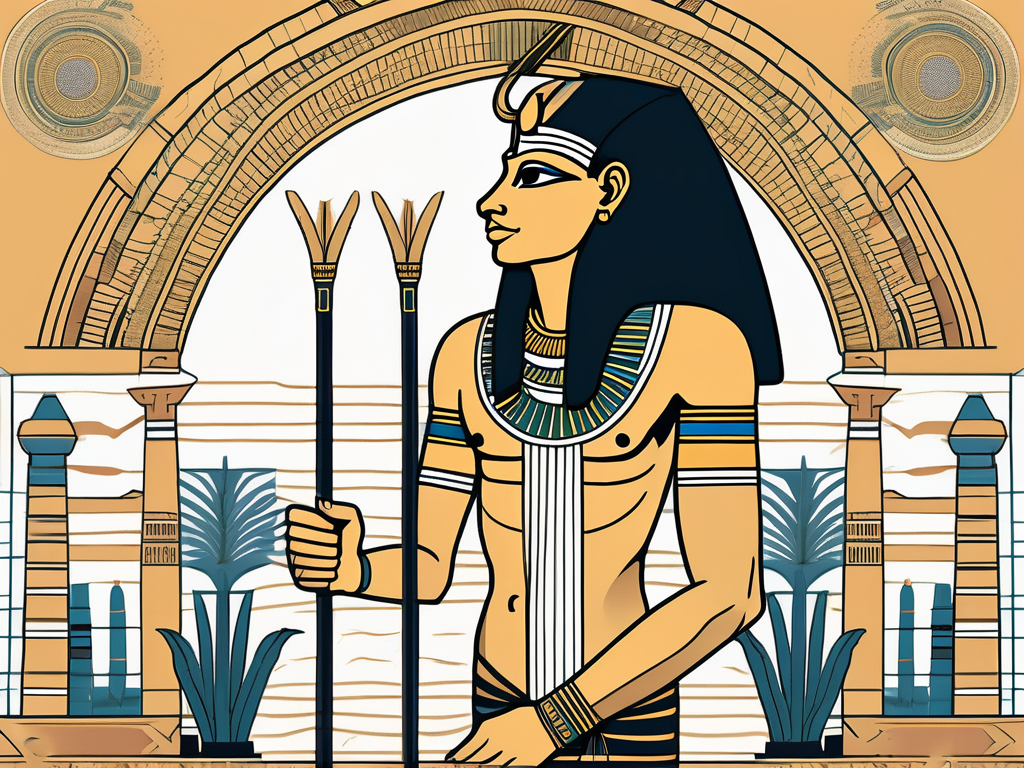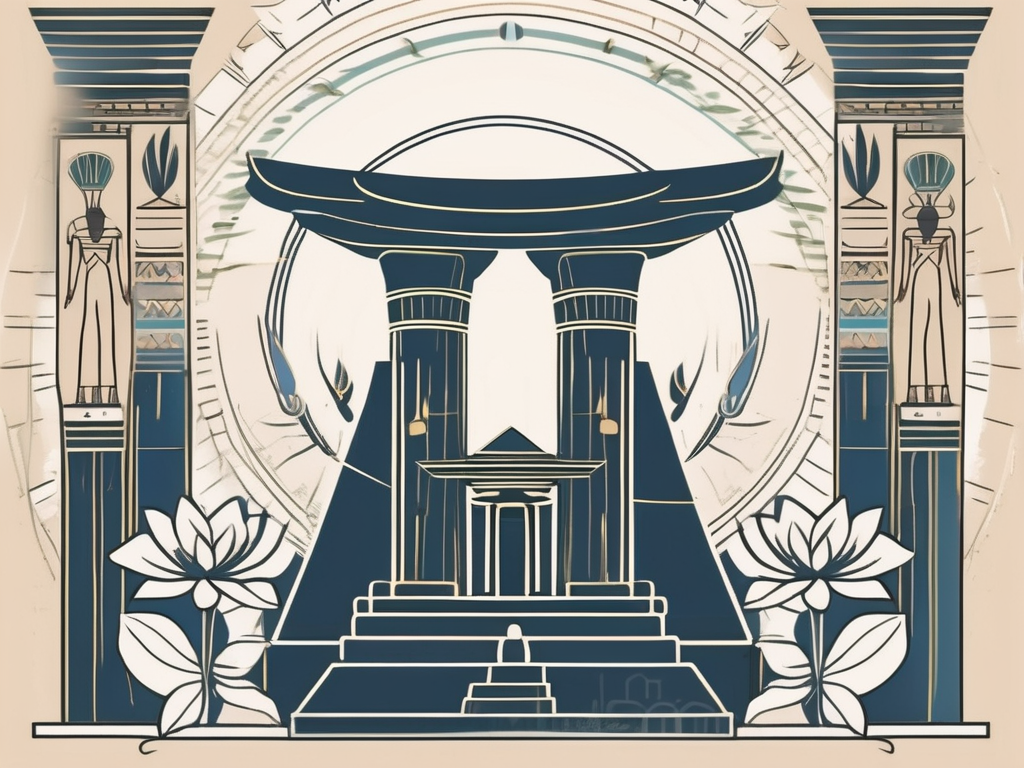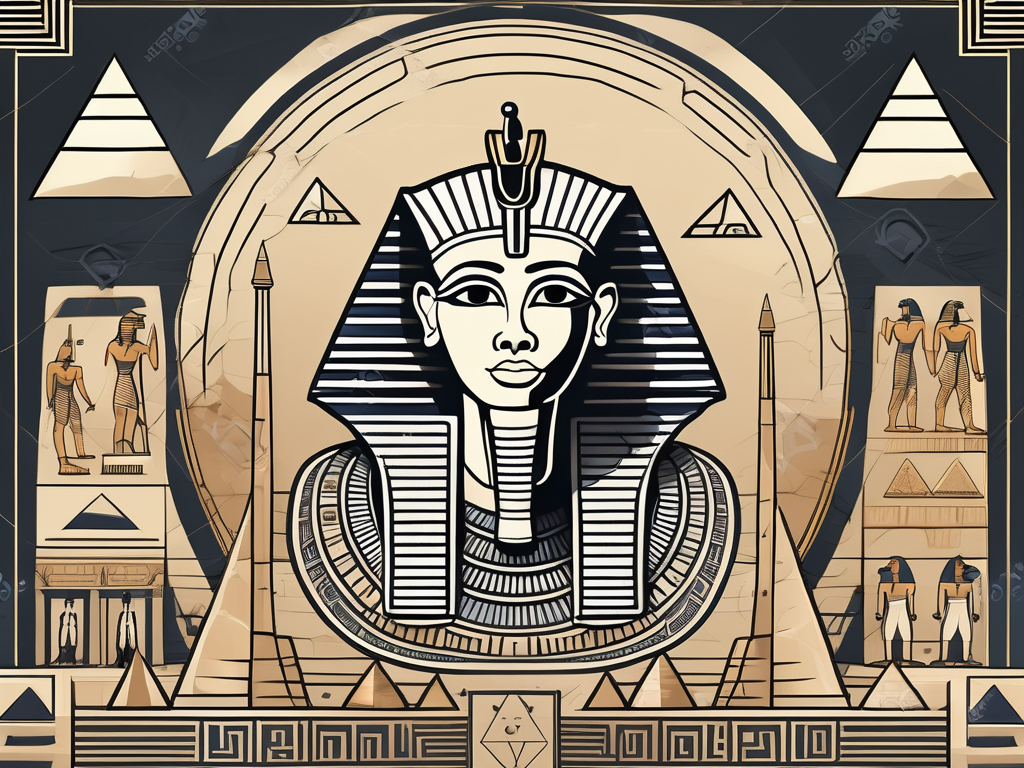Have you ever wondered about the gods and goddesses of Ancient Egypt? One fascinating and often overlooked deity is Hapy, the joyful god of the Nile and fertility. In this article, we will delve deep into the rich mythology and significance of Hapy in Ancient Egyptian culture. From his role in the Nile’s abundance to his influence on society and art, Hapy’s legacy still resonates today.
Understanding the Role of Hapy in Ancient Egyptian Mythology
Mythology played an essential role in the lives of ancient Egyptians, shaping their beliefs and guiding their actions. Hapy, portrayed as a paunchy, bearded figure with feminine attributes, held an important place in their pantheon of gods. He was often depicted as a symbol of joy, fertility, and abundance.
The symbolism of Hapy was multifaceted, reflecting different aspects of Egyptian culture. One representation showed him with water plants on his head, symbolizing the flourishing agriculture and the Nile’s bountiful harvests. Another portrayal showed him with papyrus flowers, representing the abundance of fertility.
Hapy’s association with the Nile and fertility earned him a pivotal role in the agricultural cycle. The ancient Egyptians revered the Nile as the lifeblood of their civilization, and Hapy’s presence in their beliefs emphasized the importance they placed on sustaining abundant crops and a prosperous society.
In ancient Egyptian culture, Hapy’s symbolism permeated various aspects of life, from religious rituals to artistic expressions. He was closely associated with the annual flooding of the Nile, which brought fertile silt and nourished the land. The inundation was seen as a divine act, and Hapy was believed to be responsible for its occurrence.
His association with the Nile and fertility extended beyond symbolism and found expression in numerous rituals and temples dedicated to his veneration. The ancient Egyptians built magnificent temples along the banks of the Nile to honor Hapy and seek his blessings for a fruitful harvest.
These sacred sites became focal points for ceremonies and offerings, with priests and devotees gathering to pay homage to Hapy. The rituals were believed to invoke his benevolence and ensure the continued fertility of the land. It was a shared belief that a harmonious relationship with Hapy would guarantee prosperity and a prosperous kingdom.
Furthermore, Hapy’s influence extended beyond agriculture and permeated other aspects of ancient Egyptian society. He was also associated with the annual flooding of the Nile, which not only brought fertile silt but also served as a means of transportation and trade. The floodwaters allowed boats to navigate the river, facilitating commerce and connecting different regions of Egypt.
Moreover, Hapy’s role in ancient Egyptian mythology went beyond his association with fertility and the Nile. He was also believed to have the power to bring joy and abundance to individuals’ lives. As a symbol of joy, Hapy was often invoked during celebrations and festivals, where people would offer prayers and make offerings to ensure happiness and prosperity.
Additionally, Hapy’s depiction as a paunchy, bearded figure with feminine attributes reflected the ancient Egyptians’ understanding of gender fluidity. In their culture, gender was not strictly binary, and gods like Hapy embodied both masculine and feminine qualities. This representation emphasized the interconnectedness and balance of the natural world, where fertility and abundance were seen as a result of harmonious union.
In conclusion, Hapy held a significant place in ancient Egyptian mythology, symbolizing joy, fertility, and abundance. His association with the Nile and agricultural cycle made him a revered deity, worshipped through rituals and ceremonies. The multifaceted symbolism of Hapy reflected various aspects of Egyptian culture, from the importance of sustaining abundant crops to the understanding of gender fluidity. Understanding the role of Hapy provides valuable insights into the beliefs and values of ancient Egyptians.
The Worship and Rituals of Hapy
In the grand tapestry of Ancient Egypt, Hapy’s influence stretched far and wide, extending even into the realm of politics and governance. As the god associated with the Nile’s fertility, Hapy played a vital role in the agricultural well-being of the kingdom. His blessings were crucial to ensure the abundance of crops, which in turn impacted the pharaoh’s rule.
Temples and Sacred Sites Dedicated to Hapy
Throughout Egypt, magnificent temples were erected to honor Hapy and celebrate his connection to the Nile and fertility. These sacred sites served as gathering places for worshippers, who sought the god’s favor through prayers, songs, and offerings.
One such famous temple was the Temple of Hapy in Elephantine Island, located in the southern region of Egypt. This temple, dedicated to Hapy and his divine consort, Anuket, was a beacon of religious devotion and a place of pilgrimage for those seeking the god’s blessings.
Ritual Practices and Offerings to Hapy
The rituals performed in honor of Hapy were integral to the religious and cultural fabric of Ancient Egypt. These rituals involved intricate ceremonies performed by skilled priests and devotees. They encompassed everything from music and dance to elaborate processions and sacred texts.
Offerings made to Hapy during these rituals included fruits, vegetables, and flowers, representing the abundance and fertility desired by the ancient Egyptians. The act of leaving offerings was both an act of gratitude and a way to ensure continued blessings from the god.
Hapy’s Influence on Ancient Egyptian Society
Hapy’s impact on ancient Egyptian society transcended mere mythology and religion. The god’s association with the Nile’s fertility had tangible effects on agriculture and harvests, shaping the lives of the people in profound ways.
Hapy’s Impact on Agriculture and Harvest
The annual flooding of the Nile, attributed to Hapy, played a vital role in the agricultural prosperity of ancient Egypt. The river’s floodwaters would deposit nutrient-rich silt across the fields, renewing the soil’s fertility and ensuring bountiful harvests.
A failed flood or a drought would spell disaster for the kingdom, as it would result in poor crop yields and eventual food shortages. As such, the ancient Egyptians closely monitored the river’s behavior, offering prayers and rituals to Hapy to ensure his favor and the river’s abundance.
The Role of Hapy in Pharaoh’s Rule
Just as the Nile’s fertility impacted agriculture, it also affected the pharaoh’s reign. The ruler of Egypt was seen as the intermediary between the gods and the people, responsible for maintaining cosmic order and ensuring the kingdom’s prosperity.
As Hapy was associated with the river that sustained Egyptian agriculture, the pharaoh’s ability to manage the Nile’s annual flood played a pivotal role in their perceived divine mandate. Demonstrating an understanding of Hapy’s role and successfully overseeing the kingdom’s agricultural well-being solidified the pharaoh’s authority and legitimacy.
Hapy in Ancient Egyptian Art and Hieroglyphs
The influence of Hapy can be seen not only in religious practices and societal structures but also in the vibrant world of Ancient Egyptian art. Wall paintings and sculptures found throughout Egypt bear witness to the reverence and importance bestowed upon this joyful god.
Depictions of Hapy in Wall Paintings and Sculptures
Artistic representations of Hapy often emphasized his distinctive attributes, showcasing the god’s buxom figure, rounded belly, and wide smile. These depictions captured Hapy’s essence of joy and conveyed his role as a bringer of abundance and prosperity.
Many wall paintings portrayed Hapy in conjunction with the Nile, incorporating scenes of bountiful harvests and agricultural activities. These vibrant works offered glimpses into the symbiotic relationship between Hapy and the Egyptian people.
The Symbolism of Hapy in Hieroglyphic Texts
Hieroglyphic texts provide further insights into the symbolism of Hapy and his significance in ancient Egypt. In these intricate writings, Hapy is often depicted as an ideogram representing the Nile, emphasizing his association with the river and its life-giving properties.
The hieroglyphs also speak of Hapy’s importance in rituals and ceremonies, underscoring the close connection between religion, mythology, and everyday life in ancient Egypt.
The Legacy of Hapy in Modern Times
The influence of Hapy persists even in modern Egyptian culture, reflecting the lasting impact of the ancient gods on the world today. While ancient Egyptian spirituality has evolved and merged with other belief systems, remnants of Hapy’s joyful presence can still be found.
Hapy’s Influence on Modern Egyptian Culture
Modern Egypt cherishes its rich heritage, and Hapy’s symbolic role continues to resonate with the Egyptian people. Festivals and celebrations honoring the Nile’s annual flooding and abundance pay homage to the god’s legacy, connecting ancient traditions with contemporary customs.
The reverence for Hapy also extends to the fields of archaeology and Egyptology, where scholars and enthusiasts delve into the depths of history to uncover the secrets of Ancient Egypt, including the enigmatic nature of Hapy.
The Representation of Hapy in Contemporary Media and Literature
While Hapy may not enjoy the same visibility today as he did thousands of years ago, his presence can still be felt in various forms of media and literature. Books, films, and artwork inspired by Ancient Egypt often incorporate Hapy’s character, allowing new generations to experience the captivating world of Egyptian mythology.
By shining a light on Hapy’s joyous influence, these contemporary interpretations ensure that the god remains an integral part of our collective understanding of Ancient Egypt.
In conclusion, Hapy, the joyful Egyptian god of the Nile and fertility, played a significant role in Ancient Egyptian culture and mythology. From his association with the river’s abundance to his influence on agriculture, politics, and art, Hapy’s presence was pervasive. Today, his legacy lives on through the continued celebration of the Nile’s fertility and the exploration of Egypt’s illustrious history. Let us embrace the joyful spirit of Hapy and appreciate the enduring significance of this ancient god.












